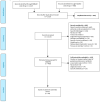Systematic Review on the Impact of Guidelines Adherence on Antibiotic Prescription in Respiratory Infections
- PMID: 32867122
- PMCID: PMC7557871
- DOI: 10.3390/antibiotics9090546
Systematic Review on the Impact of Guidelines Adherence on Antibiotic Prescription in Respiratory Infections
Abstract
Overuse and inappropriate antibiotic prescription for respiratory tract infections (RTI) are one of the major contributors to the current antibiotic resistance problem. Guidelines provide support to prescribers for proper decision-making. Our purpose is to review the impact of prescribers' exposure to guidelines in antibiotic prescription for RTIs. A systematic review was performed searching in the scientific databases MEDLINE PubMed and EMBASE for studies which exposed prescribers to guidelines for RTI and compared antibiotic prescription rates/quality before and after the implementation, with thirty-four articles included in the review. The selected studies consisted on a simple intervention in the form of guideline implementation while others involved multifaceted interventions, and varied in population, designs, and settings. Prescription rate was shown to be reduced in the majority of the studies, along with an improvement in appropriateness, defined mainly by the prescription of narrow-spectrum rather than broad-spectrum antibiotics. Intending to ascertain if this implementation could decrease prescription costs, 7 articles accessed it, of which 6 showed the intended reduction. Overall interventions to improve guidelines adherence can be effective in reducing antibiotic prescriptions and inappropriate antibiotic selection for RTIs, supporting the importance of implementing guidelines in order to decrease the high levels of antibiotic prescriptions, and consequently reduce antimicrobial resistance.
Keywords: adherence; antibiotic prescription; guidelines; respiratory tract infections; review.
Conflict of interest statement
The authors declare no conflict of interest.
Figures
Similar articles
-
Educational Interventions to Reduce Prescription and Dispensing of Antibiotics in Primary Care: A Systematic Review of Economic Impact.Antibiotics (Basel). 2022 Sep 2;11(9):1186. doi: 10.3390/antibiotics11091186. Antibiotics (Basel). 2022. PMID: 36139965 Free PMC article. Review.
-
Variation in antibiotic prescription rates in febrile children presenting to emergency departments across Europe (MOFICHE): A multicentre observational study.PLoS Med. 2020 Aug 19;17(8):e1003208. doi: 10.1371/journal.pmed.1003208. eCollection 2020 Aug. PLoS Med. 2020. PMID: 32813708 Free PMC article.
-
Can antibiotic prescriptions in respiratory tract infections be improved? A cluster-randomized educational intervention in general practice--the Prescription Peer Academic Detailing (Rx-PAD) Study [NCT00272155].BMC Health Serv Res. 2006 Jun 15;6:75. doi: 10.1186/1472-6963-6-75. BMC Health Serv Res. 2006. PMID: 16776824 Free PMC article.
-
Reduction of antibiotic prescriptions for acute respiratory tract infections in primary care: a systematic review.Implement Sci. 2018 Mar 20;13(1):47. doi: 10.1186/s13012-018-0732-y. Implement Sci. 2018. PMID: 29554972 Free PMC article.
-
Reduction in antibiotic prescribing for respiratory tract infections in Swedish primary care- a retrospective study of electronic patient records.BMC Infect Dis. 2016 Nov 25;16(1):709. doi: 10.1186/s12879-016-2018-9. BMC Infect Dis. 2016. PMID: 27887585 Free PMC article.
Cited by
-
Exploring Information Available to and Used by Physicians on Antibiotic Use and Antibiotic Resistance in Jordan.Antibiotics (Basel). 2021 Aug 11;10(8):963. doi: 10.3390/antibiotics10080963. Antibiotics (Basel). 2021. PMID: 34439013 Free PMC article.
-
Examining the impact of treatment guidelines on outpatient antibiotic prescription trends at a cancer center in Pakistan.Antimicrob Steward Healthc Epidemiol. 2025 Feb 20;5(1):e51. doi: 10.1017/ash.2025.2. eCollection 2025. Antimicrob Steward Healthc Epidemiol. 2025. PMID: 40026775 Free PMC article.
-
Educational Interventions to Reduce Prescription and Dispensing of Antibiotics in Primary Care: A Systematic Review of Economic Impact.Antibiotics (Basel). 2022 Sep 2;11(9):1186. doi: 10.3390/antibiotics11091186. Antibiotics (Basel). 2022. PMID: 36139965 Free PMC article. Review.
-
Determinants of prescribing behaviour of antibacterial drugs in Europe and use of appropriate nomenclature in the literature.Naunyn Schmiedebergs Arch Pharmacol. 2025 Aug 13. doi: 10.1007/s00210-025-04511-2. Online ahead of print. Naunyn Schmiedebergs Arch Pharmacol. 2025. PMID: 40802007 Review.
-
Pharmacists' Knowledge, Attitudes, Behaviors and Information Sources on Antibiotic Use and Resistance in Jordan.Antibiotics (Basel). 2022 Jan 28;11(2):175. doi: 10.3390/antibiotics11020175. Antibiotics (Basel). 2022. PMID: 35203777 Free PMC article.
References
-
- Antimicrobial Resistance|WHO. [(accessed on 15 March 2020)]; Available online: https://www.who.int/news-room/factsheets/detail/antimicrobial-resistance.
-
- European Comission AMR: A Major Europe and Global Challenge-Factsheet. [(accessed on 15 March 2020)];2017 Available online: https://ec.europa.eu/health/amr/sites/health/files/antimicrobial_resista....
Publication types
Grants and funding
LinkOut - more resources
Full Text Sources


